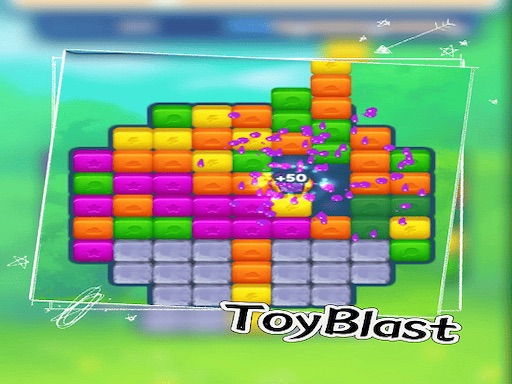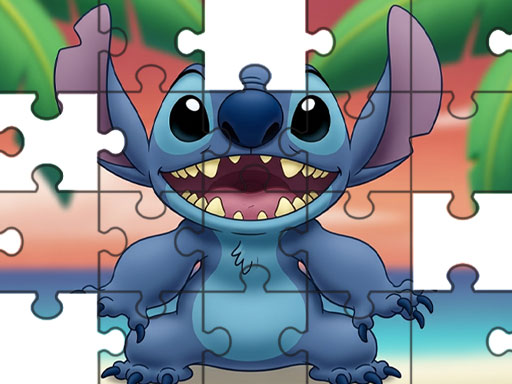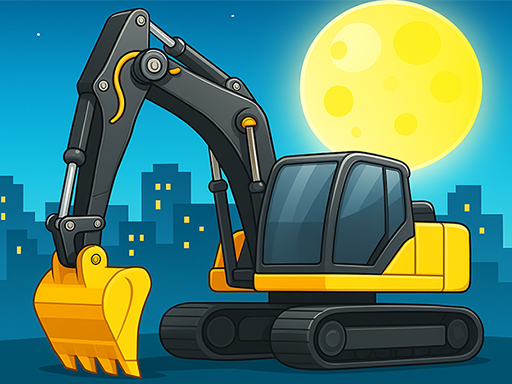Block Roll Logic
About Block Roll Logic
Oh man, you are *not* going to believe the game I just stumbled upon. Seriously, you know how I’m always on the hunt for those hidden gems, the ones that just completely swallow your sense of time and space? Well, I found one. It’s called Block Roll Logic, and honestly, it’s like someone took everything I love about spatial reasoning puzzles, polished it until it gleamed, and then injected it with pure, unadulterated satisfaction. I’m talking about that feeling you get when a complex strategy finally clicks into place, that little shiver of triumph – it’s all here, and then some.
When I first saw it, I’ll admit, I was a little skeptical. The premise sounds deceptively simple, almost too simple: you've got these vibrant, colored cubes, and your job is to guide them into their matching colored holes. That’s it. On paper, it sounds like a children's toy, right? But oh, my friend, that's where the genius lies. That initial simplicity is a Trojan horse for some of the most intricate and brain-bending challenges I've encountered in ages. You think you've got it figured out after the first few levels, breezing through, feeling like a genius, and then BAM! The game just quietly, subtly, cranks up the dial, and suddenly you're staring at a grid that looks like it was designed by a mad architect, and your brain starts to do this delightful little dance of frustration and intense focus.
What I love about games like this is that they don't rely on flashy graphics or a convoluted storyline. It's pure, unadulterated gameplay mechanics, stripped down to their essential, most elegant form. You're presented with a three-dimensional grid, often floating in some serene, almost minimalist void. The blocks themselves are beautifully rendered, solid and tactile, and you can almost feel their weight as you mentally maneuver them. And the holes? They just sit there, patiently waiting, their matching colors glowing with an almost taunting allure.
The core mechanic, the "roll," is where the magic truly happens. You're not just sliding blocks around; you're *rolling* them. Imagine a die, right? It has six faces. Now imagine that die is your block, and you need to guide it across the board, face by face, until the correct colored face is precisely aligned over its matching hole. This isn't just about getting from point A to point B; it's about the *journey* and the *orientation*. You might have a red block, and the red hole is three spaces away, but if you roll it the wrong way, you could end up with a blue face down when you reach the destination. So you have to plan not just the path, but the exact sequence of rolls, anticipating how each turn will reorient your cube. It's like a ballet of geometry and foresight.
And let me tell you, the game introduces new elements so smoothly, so organically, that you barely notice the difficulty curve steepening until you're already neck-deep in a truly epic puzzle. First, it's just open spaces. Then, suddenly, there are walls – simple enough, they block your path. But then, you get gaps, and you have to figure out how to bridge them, or use another block as a temporary stepping stone. And then, *then* it gets really interesting. You start encountering multiple blocks, sometimes different colors, sometimes needing to be placed in a specific order because one block might block the path for another. The brilliant thing about this is that the game never feels unfair. Every single solution, no matter how convoluted it seems at first glance, is always there, waiting to be discovered. It’s like the game is whispering, "You can do this. Just look a little closer."
There's something magical about those moments when you've been stuck on a level for what feels like an eternity. You've tried every permutation, rolled your block into every dead end, and you're just about ready to throw your hands up. You take a break, maybe grab a coffee, and then you come back, look at the screen with fresh eyes, and suddenly, it’s like a spotlight shines on the one path you hadn't considered. A tiny, almost imperceptible sequence of rolls that unlocks the entire puzzle. That's the "Aha!" moment, and in Block Roll Logic, those moments hit with the force of a revelation. You can almost feel that satisfying *click* in your brain as the pieces fall into place, followed by the gentle *thunk* of the final block settling perfectly into its home, and the level completion chime that's just pure auditory dopamine.
I've always been drawn to games that challenge my spatial reasoning. I mean, think about it, from the early days of Tetris to those mind-bending Portal puzzles, there's a unique satisfaction in manipulating objects in a digital space to achieve a goal. But Block Roll Logic takes it to another level because of that rolling mechanic. It adds this extra layer of complexity, this constant awareness of the block's orientation, that makes every move feel deliberate and consequential. You're not just moving a character; you're embodying the block itself, feeling its potential paths and limitations.
The game's progression is masterfully handled too. Just when you think you've mastered a particular type of obstacle, it throws a new curveball. Maybe a block that can only roll in certain directions, or platforms that disappear after one use, or even multi-colored blocks that need to be placed in specific multi-colored holes, requiring even more intricate planning. You'll find yourself sketching out paths on scrap paper, or just staring intently at the screen, visualizing the entire sequence of rolls in your head before making a single move. The tension in your shoulders, the slight furrow in your brow – that's the sign of a truly engaging puzzle game, and Block Roll Logic delivers it in spades.
What's fascinating is how the game encourages experimentation without punishing failure too harshly. You can always undo your last move, or restart the level entirely, which is a godsend when you're deep into a complex sequence and realize you made a critical error five moves ago. This low-stakes environment encourages you to really push the boundaries of your understanding, to try that seemingly impossible roll, just to see what happens. And sometimes, you'll surprise yourself. Sometimes, that wild, Hail Mary move turns out to be the key.
In my experience, the best moments come when you're so absorbed that the real world just fades away. You look up from the screen, and hours have just melted into thin air. That's Block Roll Logic for me. It's not just a game; it's a mental workout, a delightful challenge that leaves you feeling smarter and more accomplished with every solved puzzle. The visual design, while minimalist, is incredibly clean and intuitive, making it easy to parse even the most complex arrangements of blocks and holes. The subtle sound design – the gentle *clack* of a roll, the soft *whoosh* of a block appearing – it all just adds to this incredibly focused, almost meditative experience.
Honestly, if you're someone who loves to really sink your teeth into a good puzzle, who appreciates clever design and the sheer joy of overcoming a seemingly insurmountable challenge, then you *have* to check this out. It’s not about speed or reflexes; it’s about pure, unadulterated thought, planning, and that glorious moment when the solution finally blossoms in your mind. It’s the kind of game that reminds you why you fell in love with gaming in the first place – for the wonder, the challenge, and the profound satisfaction of making order out of chaos. Trust me on this one. You'll thank me later, probably around 3 AM when you realize you've just solved "one more level."
When I first saw it, I’ll admit, I was a little skeptical. The premise sounds deceptively simple, almost too simple: you've got these vibrant, colored cubes, and your job is to guide them into their matching colored holes. That’s it. On paper, it sounds like a children's toy, right? But oh, my friend, that's where the genius lies. That initial simplicity is a Trojan horse for some of the most intricate and brain-bending challenges I've encountered in ages. You think you've got it figured out after the first few levels, breezing through, feeling like a genius, and then BAM! The game just quietly, subtly, cranks up the dial, and suddenly you're staring at a grid that looks like it was designed by a mad architect, and your brain starts to do this delightful little dance of frustration and intense focus.
What I love about games like this is that they don't rely on flashy graphics or a convoluted storyline. It's pure, unadulterated gameplay mechanics, stripped down to their essential, most elegant form. You're presented with a three-dimensional grid, often floating in some serene, almost minimalist void. The blocks themselves are beautifully rendered, solid and tactile, and you can almost feel their weight as you mentally maneuver them. And the holes? They just sit there, patiently waiting, their matching colors glowing with an almost taunting allure.
The core mechanic, the "roll," is where the magic truly happens. You're not just sliding blocks around; you're *rolling* them. Imagine a die, right? It has six faces. Now imagine that die is your block, and you need to guide it across the board, face by face, until the correct colored face is precisely aligned over its matching hole. This isn't just about getting from point A to point B; it's about the *journey* and the *orientation*. You might have a red block, and the red hole is three spaces away, but if you roll it the wrong way, you could end up with a blue face down when you reach the destination. So you have to plan not just the path, but the exact sequence of rolls, anticipating how each turn will reorient your cube. It's like a ballet of geometry and foresight.
And let me tell you, the game introduces new elements so smoothly, so organically, that you barely notice the difficulty curve steepening until you're already neck-deep in a truly epic puzzle. First, it's just open spaces. Then, suddenly, there are walls – simple enough, they block your path. But then, you get gaps, and you have to figure out how to bridge them, or use another block as a temporary stepping stone. And then, *then* it gets really interesting. You start encountering multiple blocks, sometimes different colors, sometimes needing to be placed in a specific order because one block might block the path for another. The brilliant thing about this is that the game never feels unfair. Every single solution, no matter how convoluted it seems at first glance, is always there, waiting to be discovered. It’s like the game is whispering, "You can do this. Just look a little closer."
There's something magical about those moments when you've been stuck on a level for what feels like an eternity. You've tried every permutation, rolled your block into every dead end, and you're just about ready to throw your hands up. You take a break, maybe grab a coffee, and then you come back, look at the screen with fresh eyes, and suddenly, it’s like a spotlight shines on the one path you hadn't considered. A tiny, almost imperceptible sequence of rolls that unlocks the entire puzzle. That's the "Aha!" moment, and in Block Roll Logic, those moments hit with the force of a revelation. You can almost feel that satisfying *click* in your brain as the pieces fall into place, followed by the gentle *thunk* of the final block settling perfectly into its home, and the level completion chime that's just pure auditory dopamine.
I've always been drawn to games that challenge my spatial reasoning. I mean, think about it, from the early days of Tetris to those mind-bending Portal puzzles, there's a unique satisfaction in manipulating objects in a digital space to achieve a goal. But Block Roll Logic takes it to another level because of that rolling mechanic. It adds this extra layer of complexity, this constant awareness of the block's orientation, that makes every move feel deliberate and consequential. You're not just moving a character; you're embodying the block itself, feeling its potential paths and limitations.
The game's progression is masterfully handled too. Just when you think you've mastered a particular type of obstacle, it throws a new curveball. Maybe a block that can only roll in certain directions, or platforms that disappear after one use, or even multi-colored blocks that need to be placed in specific multi-colored holes, requiring even more intricate planning. You'll find yourself sketching out paths on scrap paper, or just staring intently at the screen, visualizing the entire sequence of rolls in your head before making a single move. The tension in your shoulders, the slight furrow in your brow – that's the sign of a truly engaging puzzle game, and Block Roll Logic delivers it in spades.
What's fascinating is how the game encourages experimentation without punishing failure too harshly. You can always undo your last move, or restart the level entirely, which is a godsend when you're deep into a complex sequence and realize you made a critical error five moves ago. This low-stakes environment encourages you to really push the boundaries of your understanding, to try that seemingly impossible roll, just to see what happens. And sometimes, you'll surprise yourself. Sometimes, that wild, Hail Mary move turns out to be the key.
In my experience, the best moments come when you're so absorbed that the real world just fades away. You look up from the screen, and hours have just melted into thin air. That's Block Roll Logic for me. It's not just a game; it's a mental workout, a delightful challenge that leaves you feeling smarter and more accomplished with every solved puzzle. The visual design, while minimalist, is incredibly clean and intuitive, making it easy to parse even the most complex arrangements of blocks and holes. The subtle sound design – the gentle *clack* of a roll, the soft *whoosh* of a block appearing – it all just adds to this incredibly focused, almost meditative experience.
Honestly, if you're someone who loves to really sink your teeth into a good puzzle, who appreciates clever design and the sheer joy of overcoming a seemingly insurmountable challenge, then you *have* to check this out. It’s not about speed or reflexes; it’s about pure, unadulterated thought, planning, and that glorious moment when the solution finally blossoms in your mind. It’s the kind of game that reminds you why you fell in love with gaming in the first place – for the wonder, the challenge, and the profound satisfaction of making order out of chaos. Trust me on this one. You'll thank me later, probably around 3 AM when you realize you've just solved "one more level."
Enjoy playing Block Roll Logic online for free on Viralexclusivo Games. This Puzzle game offers amazing gameplay and stunning graphics. No downloads required, play directly in your browser!
How to Play
Do you have the skills to solve every puzzle With increasing difficulty and new challenges at every level Cube to Hole Puzzle will keep you entertained for hours





Comments
This game is awesome! I love the graphics and gameplay.
One of the best games I've played recently. Highly recommended!